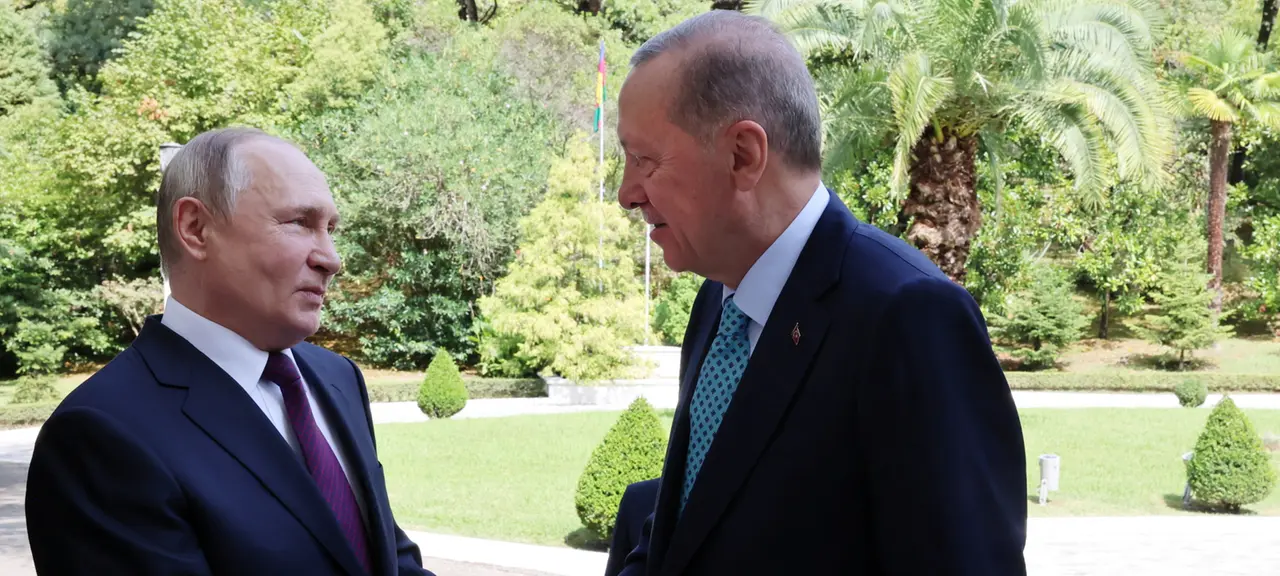In Moscow on September 4th, President Vladimir Putin conveyed to Turkey’s Tayyip Erdogan that Russia remained open to engaging in discussions concerning the Black Sea grain deal. This agreement played a pivotal role in facilitating Ukraine’s grain export and alleviating a global food crisis.
Russia withdrew from this pact in July, a year after it was brokered by the United Nations and Turkey. Russia cited hindrances to its own food and fertilizer exports and expressed dissatisfaction with the insufficient flow of Ukrainian grain to countries requiring it.
Erdogan, who had previously played a significant role in persuading Putin to uphold the agreement, along with the United Nations, is endeavoring to bring Russia back to the negotiating table.
During their meeting in the Black Sea resort of Sochi, Putin expressed hope for progress in discussions concerning a natural gas hub in Turkey and confirmed that they would also address the matter of the grain deal.
“I understand that you plan to raise the issue of the grain deal,” Putin conveyed to Erdogan. “We are open to negotiations on this matter.”
Erdogan stressed the global anticipation surrounding the grain corridor issue, saying, “The world is eagerly awaiting the outcomes of our meeting today. I believe that the message conveyed during the press conference following our meeting will be a significant development for the entire world, particularly for African nations.”
The primary objective of the grain deal was to facilitate the movement of Ukrainian grain to international markets via the Black Sea, thus mitigating the global food crisis exacerbated by Russia’s full-scale invasion of Ukraine in February the previous year.
Both Russia and Ukraine are major players in the global agricultural landscape, particularly in markets such as wheat, barley, maize, rapeseed, rapeseed oil, sunflower seed, and sunflower oil.
Before the talks with Erdogan, Ukrainian officials reported that Russia had conducted an overnight air attack on one of Ukraine’s major grain-exporting ports. Romania denied a Ukrainian statement that Russian drones had fallen and detonated on its territory.
Putin has indicated that Russia might reconsider the grain deal if the West fulfills a separate memorandum agreed upon with the United Nations simultaneously, aimed at facilitating Russian food and fertilizer exports. While Western sanctions have not targeted Russian food and fertilizer exports directly, Moscow contends that restrictions on payments, logistics, and insurance have impeded these shipments.
U.N. Secretary-General António Guterres mentioned sending “a set of concrete proposals” to Russian Foreign Minister Sergei Lavrov in an effort to revive the deal. One of Moscow’s key demands is the reconnection of the Russian Agricultural Bank to the SWIFT international payments system, from which the EU disconnected it in June 2022 in response to the invasion.
Maria Zakharova, spokeswoman for the Russian foreign ministry, noted that certain implied commitments from the previous agreement had not been fulfilled, though she did not specify details. In their report on the meeting with Erdogan, Russian state television emphasized the importance of fulfilling promises made to Russia.
Since the invasion of Ukraine, Russia has blockaded Ukrainian Black Sea ports and threatened to treat all vessels as potential military targets after exiting the U.N.-backed deal, which had enabled Ukraine to export tens of millions of metric tons of agricultural produce.
In response, Ukraine declared a “humanitarian corridor” along the western Black Sea coast near Romania and Bulgaria. On Sunday, the Liberia-flagged Anna-Theresa sailed out of the Black Sea through Istanbul using this corridor.
Furthermore, Russia has been in discussions regarding a Putin-initiated plan to supply up to 1 million tonnes of Russian grain to Turkey at reduced prices for subsequent processing in Turkish facilities and shipment to countries in dire need.
